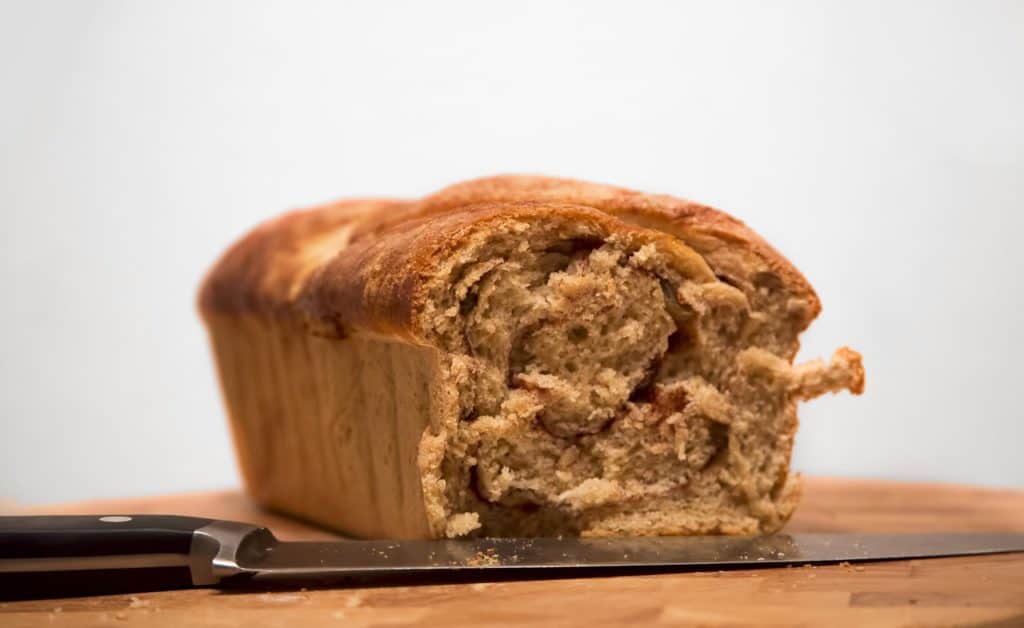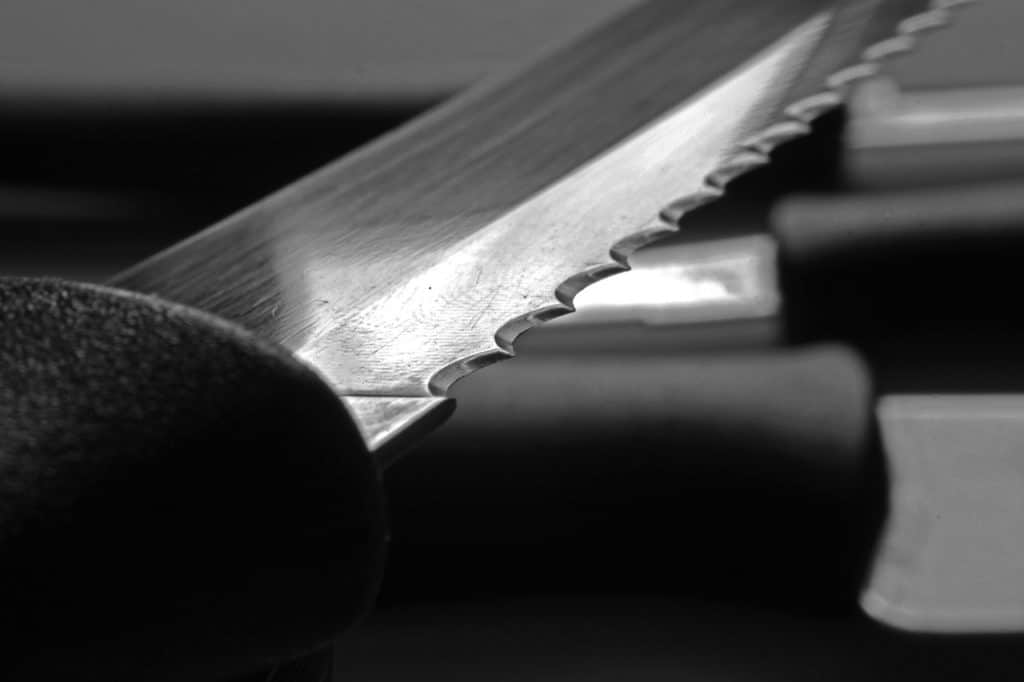Bread Knife
– Non-Fiction by Kay Kramer – April 12, 2019

Mama and Barry mashed lumpy boiled potatoes into furrows with their forks, spread sour cream on top. I hated it. Mama cooked this every night, except the weekends when we had stringy boiled chicken.
I crunched my cold supper of crisp carrots, celery and iceberg lettuce, craving a hamburger, hot dog and French fries like the ones I smelled on the grill at the Five and Ten. I’d worked part-time since my fourteenth birthday last May. “You could fry the potatoes,” I said.
“Oil costs too much.”
“I like baked potatoes. There’s no oil in them.”
“Gas is very expensive.”
“Cook noodles.” I liked the egg noodles with cottage cheese and brown sugar that Mama made every few months.
“Egg noodles cost more than potatoes.”
“You should get off Welfare–”
“I’m not on Welfare,” Mama interrupted. Her eyes narrowed as she glared at me.
“They send you the check,” I said.
“They only send it for you because you are orphans.”
“You need to go back to work so we can eat meat.”
“How can I work? I can’t walk. My varicose veins hurt too much. They’re bleeding.”
Mama spent most of the day sitting at the kitchen window with her legs propped on a brown milk crate that she’d found on the street. Brown and blue veins bulged and branched up her legs, dotted with red blood spots, like trees blooming in spring.
“Wear your elastic stockings.”
“The stockings make my legs hurt even more.”
“You should go back to the clinic and tell the doctor. There must be a size that will fit you.”
“This is the only size that fit me. The others were too small or too big. There’s no use going back.”
“You should try.”
“Why waste money on carfare?”
It was impossible to convince Mama of anything. She had come from Europe in her twenties, worked hard, and started a business with her husband. When I was born, my father died, and Mama lost everything.
The tangy fragrance of fresh bakery bread distracted me. A golden crusted rye bread, covered with caraway seeds sat on the metal kitchen table. I picked it up.
“What are you doing?” Mama said.
“I’m cutting myself bread.”
“I’ll do it for you.”
She did everything for me and Barry because we couldn’t do anything right. I picked up the long bread knife.
“Put that down. You’ll hurt yourself.”
“I sell sharp knives at work,” I said, proud that I sold hardware at the Five and Ten and proud that I worked, unlike Mama.
“You don’t know how to cut bread.”
“I need to learn.”
Barry smiled in support as I spoke. He had worked as a messenger last summer and had started college in the fall. Welfare no longer sent money for him, but he gave Mama his earnings to pay for his food this year.
Mama stuck up her nose, “You will be a rich lady and have a maid in your house. Someone to cook and clean for you.”
I hated when she said that. “I’ll take care of myself.”
“All you know is books.”
“You never let me help you wash dishes or clean.”
“I do everything so you can study.”
“I manage a hardware counter at work.”
“You think you know more than me.”
Barry said to Mama, “You’re smarter than Einstein.”
Mama laughed. She enjoyed his teasing.
Barry smirked, “You should go back to night school and become a physicist.”
Mama laughed louder. I laughed too.
As I started to slice again, she said, “Stop! You are ruining the bread.”
“I won’t.”
“You’re crushing it.”
I loosened my tense grip and continued to slowly saw the loaf with the dull knife.
“You’ll never know how to do anything right,” she said, eyeing my mangled slice as I struggled to spread the cold, hard butter over it.
“I’ll learn,” I said, and gobbled down the crumbled, buttery sweet and sour rye.
Mama stared at me with her golden hazel eyes. “You think you’re something. Without me you’re nothing.”
I picked up the knife again. “Don’t you dare!” Her face bright red, Mama reached across the kitchen table, grabbed my arm. Pulling back from her, I drew the bread closer to me and sawed some more.
Mama took off her man’s shoe and walked around the table toward me. The shoe’s broken sole flapped. Loosened nails shone in the light as she approached. Heart pounding, I was shocked. She had rarely beaten me since we’d started counseling at Jewish Family Services.
“Stop cutting!” she said.
As she came close to me, my whole body started shaking. She’d bloodied my arms with the sole’s protruding nails before.
She raised the shoe above her head, ready to strike, and shouted, “I’ll show you.”
“Don’t come a step closer.” I pointed the knife at her.
Barry stood up and said to Mama, “You better get away from her.”
“Don’t tell me what I should do.”
When she moved closer, I stood up, raised the knife and moved toward her.
“You’re crazy,” she screamed. She turned around and ran to the kitchen doorway.
I threw the knife at her. It missed by several feet.
I sat down at the kitchen table and sobbed beside the crushed bread.
After a while Mama returned to put the food away. She said, “You’ll end up in prison or the crazy house.”
I was relieved that I hadn’t killed her and wouldn’t die in the electric chair. I didn’t want to hurt Mama.
A siren howled. Were the police coming to get me? I held my breath until the siren passed.
The next time Mama came toward me with her arm raised up, I said, “If you touch me, I will hit you back.” When she punched my arm, I punched her. Her arm was as black and blue as mine. I felt sad and guilty every time I noticed it. But she never hit me again.
Mr. Diamond, our social worker at Jewish Family Services, peered at me through thick eye glasses. I hadn’t seen him since working full-time during the summer. He seemed far away until he took his glasses off and put them on the large desk in his new office. After I told him what I’d done, he said that I needed to see a psychiatrist.
Six months later, I trembled as Mr. Diamond led me into the psychiatrist’s office at Jewish Family Services. Dr. Hoffman, a short round man with a feathery fringe of white hair, looked like Santa Claus even in his brown tweed suit and brown silk vest. In a thick German accent, he asked, “So what is the matter?”
“I tried to stab my mother.” I was afraid I was crazy and that Dr. Hoffman would send me to an insane asylum. I didn’t want to be locked up. I believed Mama when she told me that my face was green and that I needed rouge. Did my green skin and my long, wild black hair make me look like the mad woman in the attic in Jane Eyre?
Dr. Hoffman’s eyes looked kindly into mine. “What made you so angry?”
I could hardly remember. “She was going to strike me with a shoe.”
“Did you want to kill her?” He picked up his pipe and puffed out the sweet smell of tobacco.
I stared down at the wood grain of his desk. “No. I wanted her to let me slice myself a piece of bread.”
“Do you fight with her a lot?”
“I try not to, but I can’t help myself.” My fingernails were dirty.
“How are you doing in school?”
“Okay.”
“You’re a good student?”
I nodded. Dug dirt out of my fingernails.
Mr. Diamond, sitting to one side, said, “She’s an excellent student. She also has a job.”
Dr. Hoffman surprised me by asking me to draw a picture of a person. I drew a woman. “Now draw a man,” he said.
I drew women all the time, I’d never drawn a man. Embarrassed by my ignorance, I drew a tiny profile of a man’s head. The psychiatrist looked at it and said, “Now draw the whole man.”
I stared at the paper. The man I finally drew looked like a woman wearing pants.
“This is fine,” he said, looking at the picture. “If you could wish for anything in the world, what three things would you wish for?” Smoke from his pipe filled the room.
Why wish if you never got anything? If I wanted an A, I didn’t wish. I worked as hard as I could.
“I wish I was a grown up now. I wish my mother would work.”
“Do you have any other wishes?” he asked kindly.
“I wish I could be happy. That I didn’t feel crazy.”
“You are not crazy.”
“What’s the matter with me?” I continued to pick at the dirt under my fingernails.
“You have a hard time with your mother and brother.”
“When will I ever feel better?”
“You will feel good when you’re eighteen. You will be happier when you’re a grown up and you leave home.”
I felt relieved until I remembered that I was only fifteen. Three years was forever. “That’s a long time. What will I do now?”
“Mr. Diamond will help you work out your problems so you understand yourself and you will feel a little better for now.” Dr. Hoffman stood up. He shook my hand and said, “It’s a pleasure to meet such a lovely young lady.”
Why didn’t he see anything wrong with me? Why didn’t he think I belonged in an insane asylum or reform school? How could he know that I’d feel better talking to Mr. Diamond?
Even though I felt a lot worse after some sessions with Mr. Diamond, I kept going to see him. He was the only person in whom I could confide about my rage at my mother and brother.
Mama snored in the twin bed beside mine. The rat-a-tat from her nose shot bullets through my brain. I lay there in the middle of the night thinking about all the ways I hated her.
I felt hot. I needed a glass of cold water. It was darker than it had ever been. Arms stretched out, I groped my way out of the bedroom and down the hallway. I turned on the bare bulb in the kitchen.
 The bread knife gleamed in the kitchen drawer. I picked it up, curled my hand around the wooden handle, ran my fingers along the steel edge. Felt the pointy tip. The knife was sharp enough to kill. I put it back down, closed the drawer.
The bread knife gleamed in the kitchen drawer. I picked it up, curled my hand around the wooden handle, ran my fingers along the steel edge. Felt the pointy tip. The knife was sharp enough to kill. I put it back down, closed the drawer.
I drank a glass of cold water. Just before clicking out the kitchen light, I turned back, opened the drawer, and picked the knife up again. Pointing the sharp tip at the floor, so I wouldn’t stab myself, I staggered through the dark, back to the bedroom.
Mama lay corpse-like in her shining white shroud. I thrust the knife into the black hole between her breasts. She still snored. I stabbed her again and again. Her snoring stopped.
I pulled the knife out of Mama’s chest, washed off the blood, carefully wiped away fingerprints, put the knife back in the drawer.
Back in bed, it was quiet. I wished I hadn’t done it. If only I could turn time back, but it was done. I lay there for a long time till I fell asleep.
Before dawn, I startled out of sleep and remembered. Mama lay dead beneath the white sheet in her white nightgown. My mind whirled. What would happen to me?
I trembled, waiting for Barry to find us. The lion roared in the Bronx Zoo down the street. I’d run away. But where could I go?
A snore. And another snore. I took a deep breath. I was not a murderer.
I was surprised Mr. Diamond wasn’t horrified by my nightmare. He looked at me kindly, squinting through his thick eyeglasses. “How do you feel about it now?” he said.
“Scared,” I replied. What did he think of me? I didn’t want to hurt anyone.
“What are you scared of?” He lit a cigarette.
“I might murder her. I hate her, and she hates me.”
“Your mother doesn’t hate you. She doesn’t know how to deal with you.”
“She should tell me about my father.”
“She thinks you need to be more grown-up.”
“What do you think?” I asked coolly while churning at the injustice of being the only one not to know how my father died.
“I can only obey her wishes,” Mr. Diamond said, blowing out cigarette smoke.
I stared at his new mustache. “The German people obeyed Hitler. You’re obeying Mama’s orders.”
Mr. Diamond paused. “This is very different.”
“Maybe Mama doesn’t want me to know because she caused his death.”
“She was giving birth when he died.”
Surprised by this new information, I was silent. This was the most I’d been told. Mr. Diamond tilted back in his chair. He blew smoke rings.
“Maybe she killed him before she gave birth.”
“That’s not what happened.” He flicked a long cigarette ash into the glass ashtray.
“I can’t stop hating her. I might walk in my sleep and stab her. Next time she’ll be dead.”
“Maybe you should move out.” He stubbed out his cigarette.
“There’s no place for me to go.” I picked at the loose cuticle on my thumb.
“Could you live with your aunt?”
“They don’t have room for me.”
He said, “You’re not going to kill your mother.”
“How can you be so sure?”
“Because I know you. Would you like to come see me next week?”
I nodded. Mr. Diamond said, “We’re starting a group for young people like you who are in conflict with their parents. Who want to leave home. Are you interested in meeting with them and a psychologist?”
This immediately excited me. I couldn’t reveal my awful home life to my friends because I was certain that they’d reject me.
The group met in a dimly lit room at Jewish Family Services. At fifteen, I was the youngest. After introducing ourselves, the eight of us sat around a long wood table. Jack, a hefty man and the oldest in our group finally said. “I just turned twenty-one. I want to move out, but I can’t. My parents are against it.”
I was surprised to hear that from a grown-up man.
Carl said, “My father says I can’t leave him alone. He’s got no one else. I’m still at Queens College. I can’t support myself yet, but when I can, I’m leaving.” His mousy look contrasted with his assertive words. “Do you have a job, Jack?” Carl asked.
“I just got a new sales job—working on commission. I’ll soon know if it pays enough for my own apartment.” The two fellows talked on. The rest of us remained silent.
A couple of meetings later, I finally spoke up. “My mother treats me like a baby. She won’t let me get myself a glass of water, wash my own dishes, or sweep the floor.”
Sara said, “You’re lucky. My mother makes me clean the house, wash dishes, fold laundry and iron. She doesn’t let me go anywhere except school. I can’t see friends. I wish I had a mother like yours.”
“What would your mother do if you went out?” I asked.
“She’d throw me out of the house.”
Sara was two years older than me. For a moment I appreciated the freedom Mama gave me. “What will you do when you graduate?” I asked her.
“My mother says girls don’t go to college. But they’re paying for my brother to go. I’ll get a job.” Sara slumped in her chair.
“Will you move out then?”
“If I move out, they’ll sit shiva for me, treat me like I’m dead, never see me again. I don’t want to lose them.” I believed her—that’s what Orthodox Jews did. Nice Jewish girls never left home until they married or went away to college.
I wanted to break out of this female mold, but I was too afraid to emancipate, get a full-time job and finish high school at night.
Weeks later, when I finally told the group about my recurring nightmare of murdering my mother, Carl said, “I’m really mad at my father. Sometimes I feel like killing him.” Jack nodded his head.
They didn’t think I was crazy. I was okay.
–
 About the Author – Kay Kramer
About the Author – Kay Kramer
Kay Kramer is a retired clinical psychologist and grandmother. Her work has been published in Tule Review, Americas Review, Chiron Review, Gravel Magazine, and Dime Show Review.
–
–
–
Did you like this non-fiction piece by Kay Kramer? Then you might also like:
Madonnas
The Red Jeep
No Pain, No Gain
Gelato and Frost
Recipe for Saying Goodbye
To check out all the non-fiction available on Dreamers, like this story by Kay Kramer, visit our non-fiction section!